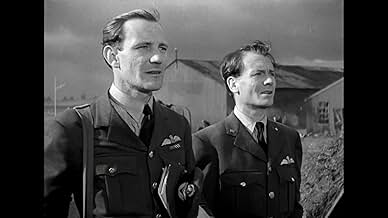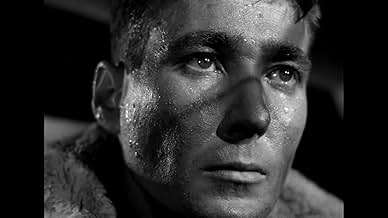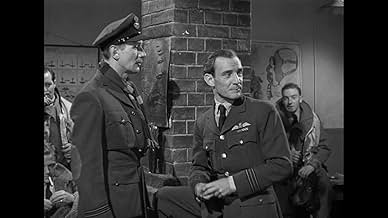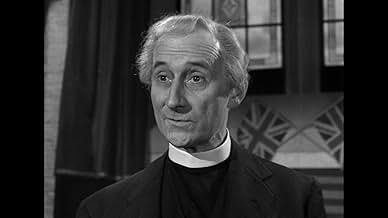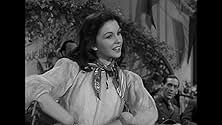IMDb RATING
7.3/10
1.8K
YOUR RATING
The wartime daily routine on a British bomber base in southeastern England is revealed through the eyes of newly arrived Flying Officer Peter Penrose (Sir John Mills).The wartime daily routine on a British bomber base in southeastern England is revealed through the eyes of newly arrived Flying Officer Peter Penrose (Sir John Mills).The wartime daily routine on a British bomber base in southeastern England is revealed through the eyes of newly arrived Flying Officer Peter Penrose (Sir John Mills).
- Awards
- 1 nomination total
Renée Asherson
- Iris Winterton
- (as Renee Asherson)
Bonar Colleano
- Joe Friselli
- (as Bonar Colleano Jnr)
Nicholas Stuart
- Col. Rogers
- (as Tryon Nichol)
Bill Owen
- 'Nobby' Clarke
- (as Bill Rowbotham)
Featured reviews
What an excellent film, with a cast that lifts it above other films made during WW2. Was there a British war film made that did not have John Mills starring in it? Many of the actors here went on to become familiar faces in film and British TV. The story-line and the absence of background music do make this film both nostalgic and entertaining.
It may interest some that the 'Golden Lion' in the film does exist, it is a hotel in Northallerton, North Yorkshire. The street scenes were shot in nearby Bedale. I'm not sure which airfield was used, but it may have been one of the many bomber bases situated in this area, such as Leeming or Dishforth.
It may interest some that the 'Golden Lion' in the film does exist, it is a hotel in Northallerton, North Yorkshire. The street scenes were shot in nearby Bedale. I'm not sure which airfield was used, but it may have been one of the many bomber bases situated in this area, such as Leeming or Dishforth.
I saw this film in Britain as a child when it first came out. The whole of our little town talked about it for days after it was shown in our single cinema. Of course, our population had been swollen by forces personnel, including airmen, so we were intimately familiar with the kind of events shown in the film. Now, learning from your web site the details of the distinguished writers, cast and production team, I understand better why it made such a deep impression. In brief, the film embodies the spirit of Britain as I remember it: firm resolve to defeat the Nazi evil, together with the consciousness of the tragedies and also the comic moments of World War II. This is something that is hard to imagine today, in Britain or elsewhere, and especially since the disillusionment produced by the Vietnam War. If only for this reason, the film is an invaluable testimony, truly portraying how British society was then. Other films from the 1940s are repeated constantly on TV; I have been waiting over fifty years to see this one again. Isn't it time for a video/DVD?
The story is set around an English bomber air base during WWII, which subsequently becomes host to the US 8th air force. The principle characters frequent the local inn, run by 'Toddy', the wife of Flight Lieut. David Archdale.
There is an ensemble of emotions, but the theme concentrates on stiff upper lip stoicism as bomber aircrew are faced with terrible odds of survival, and friends and loved ones make the best of the situation.
The movie was obviously made as a morale booster at the end of the war in Europe and features an outstanding poem that serves as an epitaph to airmen killed in action. The poem is a parody on one written by Heinrich Hoffman, the title translating to `The Story of Johnny Head-In-Air' [1844].
For Johnny
Do not despair for Johnny head-in-air; he sleeps as sound as Johnny underground. Fetch out no shroud for Johnny-in-the-cloud; and keep your tears for him in after years. Better by far for Johnny-the-bright-star, to keep your head and see his children fed. [John Purdey (RAF 1941-1945)]
There is an ensemble of emotions, but the theme concentrates on stiff upper lip stoicism as bomber aircrew are faced with terrible odds of survival, and friends and loved ones make the best of the situation.
The movie was obviously made as a morale booster at the end of the war in Europe and features an outstanding poem that serves as an epitaph to airmen killed in action. The poem is a parody on one written by Heinrich Hoffman, the title translating to `The Story of Johnny Head-In-Air' [1844].
For Johnny
Do not despair for Johnny head-in-air; he sleeps as sound as Johnny underground. Fetch out no shroud for Johnny-in-the-cloud; and keep your tears for him in after years. Better by far for Johnny-the-bright-star, to keep your head and see his children fed. [John Purdey (RAF 1941-1945)]
The great thing about this war flying film is that there's hardly any flying in it. It's all about the terrible toll war takes on normal people. What makes it so gripping to a modern audience is how the characteristic emotional restraint of people at that time is so faithfully portrayed. That's why it doesn't date. You just know that's how people really were back then.
Above all, it's the Rattigan screenplay, with its wonderful trilogical structure that speaks out.
If you want to see how people really felt and acted in England in WW2, in a beautiful, tragic film, then you must see it.
Above all, it's the Rattigan screenplay, with its wonderful trilogical structure that speaks out.
If you want to see how people really felt and acted in England in WW2, in a beautiful, tragic film, then you must see it.
Certainly one of the best films to come out of the second world war. Basically the story of a mixture of American and English servicemen placed together on an air force base in England. The film depicts the tragedies of the air crews and their missions over Germany, as well as the comedy side of the English and American airmen each trying to teach the other the game of baseball and cricket. Some superb acting by an outstanding cast. But where oh where can one obtain this splendid movie ???
Did you know
- TriviaThe poem "For Johnny" read by Sir John Mills is as follows: "Do not despair, For Johnny-head-in-air; He sleeps as sound, As Johnny underground. Fetch out no shroud, For Johnny-in-the-cloud; And keep your tears, For him in after years. Better by far, For Johnny-the-bright-star, To keep your head, And see his children fed."
- GoofsAs the American pilot alights to join the first US bombers leaving to bomb the Nazis on "Aug. 17" (1942) his Mae West is visibly stenciled: "Insp 5/3/44" .
- Quotes
Squadron Leader Sil Carter: Well, chaps, as you know the target for this afternoon is exactly the same as yesterday's, and the day before yesterday's, and the day before that. Calais. Barge concentrations.
- Crazy creditsThe end credits play over a night sky showing a crescent moon and many stars.
- How long is Johnny in the Clouds?Powered by Alexa
Details
- Release date
- Country of origin
- Language
- Also known as
- Put do zvezda
- Filming locations
- The Golden Lion Hotel, 114 High Street, Northallerton, North Yorkshire, England, UK(exteriors of village pub)
- Production company
- See more company credits at IMDbPro
- Runtime
- 1h 27m(87 min)
- Color
- Aspect ratio
- 1.37 : 1
Contribute to this page
Suggest an edit or add missing content

